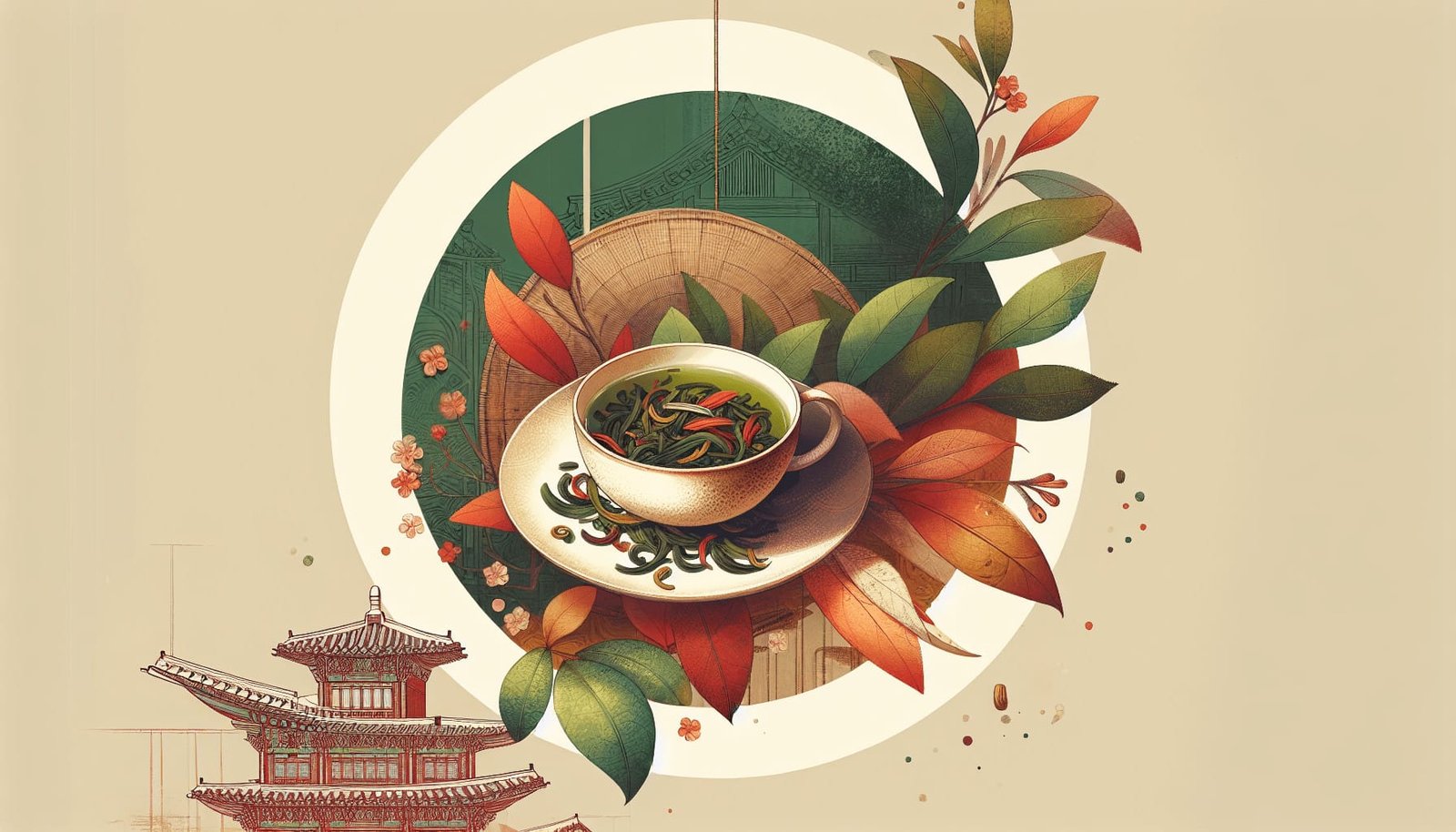Korean teas, with their rich history and unique flavors, are making a remarkable comeback in popularity. From the soothing aroma of green tea to the robust taste of barley tea, traditional Korean teas are capturing the taste buds and hearts of people worldwide. With a focus on health and wellness, as well as an increasing interest in exploring diverse cultural experiences, these teas have become a favorite choice for anyone seeking a refreshing and invigorating drink. So, let’s take a closer look at how traditional Korean teas are making a remarkable resurgence in popularity.
Health Benefits of Traditional Korean Teas
Anti-inflammatory Properties
Traditional Korean teas, such as green tea and barley tea, are known for their anti-inflammatory properties. These teas contain polyphenols, which are antioxidants that help reduce inflammation and protect the body from various diseases. Regular consumption of these teas can assist in managing chronic inflammation and promote overall health.
Weight Management
For those aiming to maintain a healthy weight, traditional Korean teas can be a beneficial addition to their routine. Green tea, in particular, has been studied for its potential to boost metabolism and burn fat. Its catechins help stimulate the body’s fat-burning process and may assist in weight management when combined with a balanced diet and regular exercise.
Digestive Aid
Korean teas like persimmon leaf tea and corn tea are often consumed to aid digestion. Persimmon leaf tea contains tannins, which can help alleviate symptoms of indigestion and bloating. Corn tea, on the other hand, is rich in vitamins and minerals that support a healthy digestive system. Incorporating these teas into your daily routine can contribute to improved digestion and gut health.
Boosting the Immune System
Protecting and strengthening the immune system is crucial for overall well-being, especially in today’s world. Traditional Korean teas, including green tea and barley tea, are packed with antioxidants and various vitamins that can help boost the immune system. These teas contain compounds like catechins and polyphenols, which support the body’s defense against infections and promote a healthier immune response.
Unique Flavors and Aromas
Green Tea Varieties
Korea is renowned for its diverse green tea variations, each offering a unique flavor and aroma. From the delicate and slightly sweet Jeoncha tea to the robust and grassy Sejak tea, there is a green tea variety to suit every taste preference. Exploring the different green tea options allows you to savor the distinct flavors and enjoy a delightful sensory experience.
Barley Tea
Barley tea, known as Boricha, is a staple in Korean households. Its nutty and slightly toasted flavor is both refreshing and comforting. This caffeine-free tea is often enjoyed cold, making it an excellent choice for hydration during hot summer days. Barley tea is also believed to have cooling properties and is commonly consumed to alleviate heat-related symptoms.
Corn Tea
With its slightly sweet and roasted flavor, corn tea, or Oksusu Cha, is a popular choice among Korean tea enthusiasts. Made from roasted corn kernels, this tea offers a unique taste that sets it apart from other traditional teas. Aside from its enjoyable flavor, corn tea is believed to have diuretic properties and is often consumed to promote healthy kidney function.
Persimmon Leaf Tea
Persimmon leaf tea, named Gamnip-cha, is another traditional Korean tea known for its distinctive flavor. This tea has a naturally sweet taste with hints of cinnamon and is often enjoyed as a dessert tea. In addition to its pleasant flavor, persimmon leaf tea is believed to have various health benefits, including digestive aid, regulation of blood sugar levels, and improvement of skin health.

Integration of Traditional and Modern Practices
Tea Ceremonies and Culture
Traditional Korean tea ceremonies are deeply rooted in the culture and history of Korea. These ceremonies, often held in serene and tranquil settings, provide a means to connect with oneself and others through the act of tea preparation and consumption. Tea ceremonies allow participants to practice mindfulness, appreciate the beauty of nature, and experience a sense of peace and harmony.
Innovative Ways of Tea Preparation
While honoring the essence of traditional Korean tea, modern innovations have also brought new ways of preparing and enjoying these teas. From tea bags and infusers to convenient ready-to-drink options, the accessibility and ease of preparation have increased significantly. These modern advancements enable individuals to incorporate traditional Korean teas into their daily lives more conveniently.
Blending with Other Ingredients
Innovation has also led to the blending of traditional Korean teas with other ingredients, creating unique and flavorful combinations. Popular blends include green tea infused with citrus fruits, barley tea with roasted grains, and persimmon leaf tea with various herbs and spices. Blending teas allows for a diverse range of flavors and provides an opportunity to experiment with exciting taste profiles.
Increased Global Interest in Korean Culture
Korean Wave and Popularity of K-Dramas
The Korean Wave, also known as Hallyu, refers to the global interest and popularity of Korean culture, including music, movies, and television dramas. K-Dramas, in particular, have gained a massive following worldwide, captivating audiences with their unique storytelling and compelling characters. As viewers immerse themselves in Korean culture through these dramas, their curiosity extends to other aspects, such as traditional Korean teas.
Efforts to Promote Korean Traditional Teas
With the rising global interest in Korean culture, there have been concerted efforts to promote traditional Korean teas internationally. Cultural organizations, tea associations, and government initiatives have showcased the rich heritage of Korean teas through events, exhibitions, and educational programs. By increasing awareness and accessibility, these efforts have played a significant role in fostering a renewed interest in traditional Korean teas.
Growing Tourism to South Korea
South Korea’s thriving tourism industry has also contributed to the resurgence of traditional Korean teas. As international travelers visit South Korea, they are exposed to not only its splendid landscapes and historical sites but also its vibrant tea culture. Many tourists are drawn to tea houses and tea plantations, where they can learn about the art of tea making and sample a wide array of traditional Korean teas.

Rising Awareness of Health and Wellness
Growing Interest in Natural and Herbal Remedies
In recent years, there has been a significant shift in people’s attitudes towards health and wellness. Many individuals are embracing natural and herbal remedies as an alternative or complement to conventional medicine. Traditional Korean teas, with their numerous health benefits and natural ingredients, have become increasingly appealing to those seeking natural solutions for their well-being.
Focus on Mindfulness and Relaxation
In the fast-paced modern world, individuals are increasingly prioritizing mindfulness and relaxation to counteract stress and promote mental well-being. Traditional Korean teas provide an opportunity to pause, appreciate the present moment, and engage in a calming ritual. The act of preparing tea and savoring its flavors encourages a sense of mindfulness and aids in emotional rejuvenation.
Trends in Healthy Lifestyles
As people become more conscious of their health, there is a growing trend towards adopting healthy lifestyles. Traditional Korean teas align with this trend perfectly, offering a natural and nourishing beverage option. With their abundance of antioxidants and health-promoting properties, these teas provide a guilt-free choice for those looking to enhance their overall well-being.
Social Media and Online Communities
Spread of Tea Enthusiasts and Influencers
The rise of social media has facilitated the spread of information and the formation of online communities centered around tea appreciation. Tea enthusiasts and influencers share their knowledge, experiences, and recommendations with a global audience, contributing to the growing interest in traditional Korean teas. Through online platforms, individuals can discover new teas, learn about their benefits, and engage in discussions with like-minded tea lovers.
Sharing Recipes and Tips
Social media platforms, blogs, and online forums have become hubs for sharing recipes and tips related to traditional Korean teas. From traditional brewing methods to innovative recipes incorporating teas in desserts and cocktails, there is an abundance of inspiration and creativity available. These online resources encourage experimentation and provide a space for individuals to connect and exchange ideas.
Virtual Tea Tastings and Events
In today’s digital age, virtual experiences have become increasingly popular. Tea companies and tea enthusiasts have adapted to this trend by organizing virtual tea tastings and events. Through live-streamed sessions, participants can learn about the history and unique characteristics of different teas, engage in interactive discussions, and have a virtual tea tasting experience, all from the comfort of their homes.

Accessibility and Availability
Online Shopping and International Shipping
The internet has made traditional Korean teas more accessible to a global audience. Online tea retailers offer a wide selection of traditional Korean teas, making it possible for anyone, regardless of their geographical location, to purchase and enjoy these teas. With international shipping options, individuals can experience the flavors and benefits of traditional Korean teas without leaving their homes.
Specialty Tea Stores and Cafes
In addition to online channels, specialty tea stores and cafes have also played a significant role in promoting traditional Korean teas. These dedicated establishments provide a physical space for individuals to explore and experience the rich tea culture of Korea. Through knowledgeable staff, tea enthusiasts can receive guidance on tea selection, preparation techniques, and even recommendations for tea and food pairings.
Promotion and Distribution Efforts
Recognizing the growing demand for traditional Korean teas, tea companies and government bodies have invested in promoting and distributing these teas on both local and international scales. Through strategic marketing campaigns, participation in tea fairs, and collaborations with retailers and distributors, traditional Korean teas have become more widely available, supporting their resurgence in popularity.
Traditional Korean Tea and Food Pairings
Traditional Korean Desserts
Traditional Korean teas are often paired with a variety of delectable desserts. For example, green tea is commonly enjoyed alongside rice cakes (tteok) or sweet red bean pastries (hoddeok). The combination of tea’s refreshing flavors and the subtle sweetness of these desserts creates a harmonious balance that delights the taste buds.
Healthy Snacks and Finger Food
For those looking for lighter options, traditional Korean teas can be paired with healthy snacks and finger foods. Enjoying a cup of barley tea with roasted seaweed or pairing persimmon leaf tea with dried fruits and nuts can provide a satisfying and nourishing snack experience. These combinations offer a balance of flavors and textures that satisfy both the palate and the need for healthy choices.
Savory Dishes and Main Courses
Korean cuisine is renowned for its extensive range of flavors and diverse dishes. Traditional Korean teas can beautifully complement savory dishes and main courses. Barley tea, with its nutty undertones, pairs well with grilled meats or spicy stews, enhancing the overall dining experience. Green tea, on the other hand, can be enjoyed alongside a variety of Korean traditional dishes, allowing the flavors to intertwine and create a harmonious blend.

Scientific Research and Studies
Proven Health Benefits
Scientific research on traditional Korean teas has affirmed their significant health benefits. Numerous studies have demonstrated the positive effects of these teas on various aspects of health, such as cardiovascular health, blood sugar management, and cognitive function. The rich antioxidant content found in traditional Korean teas has been found to have a positive impact on overall well-being.
Antioxidant Properties
Traditional Korean teas, particularly green tea, are known for their high antioxidant content. Antioxidants help protect the body from oxidative stress and reduce the risk of chronic diseases. The catechins and polyphenols present in green tea have been extensively studied for their potent antioxidant properties, making it a valuable addition to a healthy diet.
Research on Unique Compounds
Researchers have also focused on studying the unique compounds found in traditional Korean teas. For instance, persimmon leaf tea contains a compound called proanthocyanidin, which has shown promising results in reducing blood sugar levels and improving insulin sensitivity in studies. Ongoing research continues to shed light on the potential beneficial effects of other compounds found in traditional Korean teas.
Preservation of Cultural Heritage
Efforts to Preserve Traditional Korean Practices
As traditional Korean practices face the challenge of modernization, efforts are underway to preserve and promote these customs. Organizations and individuals dedicated to protecting Korean cultural heritage work tirelessly to ensure that traditional tea-making techniques, rituals, and knowledge are passed down through generations. By maintaining these practices, the unique identity and value of traditional Korean teas are safeguarded.
Recognition of Traditional Teas as Intangible Cultural Heritage
The cultural significance of traditional Korean teas has been acknowledged through their designation as Intangible Cultural Heritage by organizations such as UNESCO. This recognition highlights the importance of these teas in Korean culture and encourages their preservation. Efforts are continuously made to celebrate and raise awareness about traditional teas through festivals, exhibitions, and educational initiatives.
Celebrations and Festivals
Throughout South Korea, various celebrations and festivals dedicated to traditional Korean teas are organized, attracting locals and tourists alike. These events showcase the rich heritage and diversity of Korean teas, allowing attendees to immerse themselves in the culture, history, and flavors. Such festivities play a crucial role in fostering appreciation for traditional Korean teas and ensuring their continued relevance in modern society.
In conclusion, traditional Korean teas offer a multitude of health benefits, unique flavors, and a connection to the rich cultural heritage of Korea. With their anti-inflammatory properties, potential for weight management, digestive aid, and immune system support, these teas provide a natural and enjoyable approach to enhancing well-being. The integration of traditional and modern practices, coupled with increased global interest in Korean culture, has revived the popularity of traditional Korean teas. As awareness of health and wellness continues to grow, traditional Korean teas have found a place in the hearts and cups of tea enthusiasts worldwide. Through the power of social media, online communities, and accessibility efforts, these teas have become more readily available, allowing individuals to indulge in their flavors and experience the benefits they offer. From tea ceremonies to scientific research and preservation efforts, traditional Korean teas are cherished for their cultural significance and celebrated for their contributions to a healthier, more mindful lifestyle.

